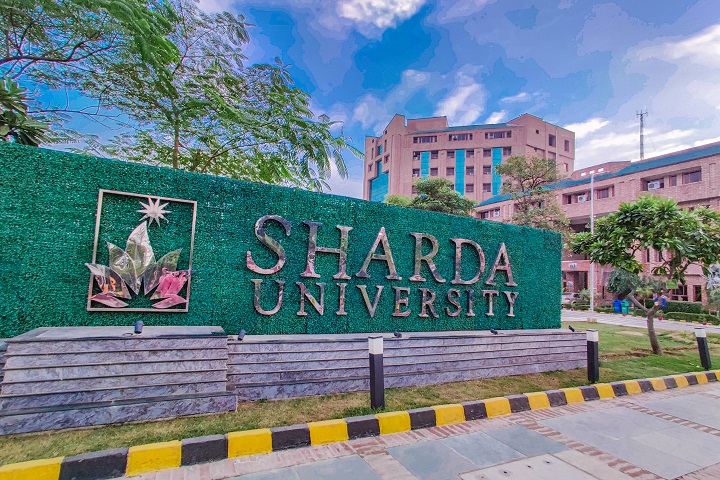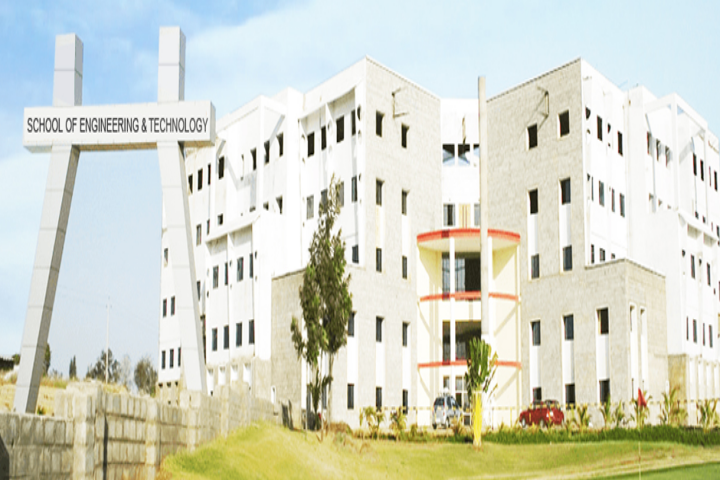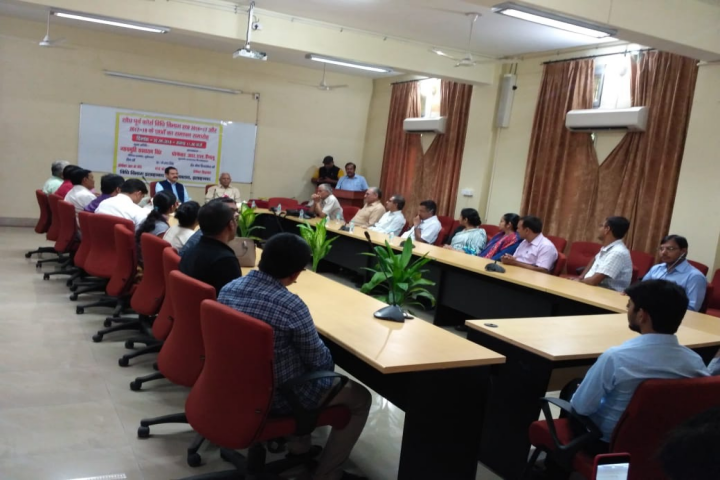
Food Nutrition Course Details - Fees, Subjects, Syllabus, Duration, Eligibility, Career Scope
Degrees offered: M.Sc., B.Sc., B.Sc.(Hons), BS, Ph.D
What is Food Nutrition
Food Nutrition is a subset of the Science field that provides students with the learning of the importance of nutrition in our food. It teaches them the skills and knowledge to preserve the nutritious elements in our diet to have a healthy diet. The degree covers in-depth learning about nutrients, vitamins, food science, malnutrition, obesity management, and various other subjects.
Both UG and PG can be pursued in food nutrition through degrees such as B.Sc, M.Sc, B.Voc, and PhD. To pursue a UG degree, an aspirant must have a 10+2 in any subject from a recognised board. On the other hand, a UG degree is required for opting for a PG degree. A total of 95 universities in India offer Food Nutrition courses at various levels.
Highlights: Food Nutrition
| Particulars | Values |
|---|---|
Branch Name | Food Nutrition |
Degree | UG: Diploma, B.Sc., B.Voc. |
Duration | UG - 3 - 4 years PG - 2 years |
Eligibility | UG - 10+2 from a recognised board |
PG - Undergraduate degree | |
Admission Process | Entrance exam / Cut off |
Top Entrance Exam | ICAR AIEEA |
Course Fees | UG - Rs. 9,000 - Rs 4 lakhs |
PG - Rs. 4,000 - Rs. 3.9 lakhs | |
Career Options | Nutritionist, Dietitian, Food Research Analyst, Food Technologist |
Average Salary | Rs. 3.5 LPA |
Recruiting Companies | Nestle, Hatsun Agro, Vadilal, National Agriculture Food Analysis Research Centre, Venky’s, Cadbury, Buhler |
Specialisations
A number of different specialisations are there for pursuing a career in food nutrition. Taking up any of these courses offers you a similar type of career in the field. Some of the important specialisations in the course are listed below for your reference.
B.Sc. (H) in Food Processing and Technology | |
B.Voc. (Food Processing & Neutraceuticals) | M.Sc. (Food Science and Technology) |
Top Private Food Nutrition Colleges in India
Many private institutions offer food and nutrition courses. These private institutions often provide more benefits than public colleges. The tuition fee is typically determined by the infrastructure and facilities available to students. The table below includes a few private colleges that offer food and nutrition, along with their respective fees:
| Top Colleges | Fees |
|---|---|
Rs. 4 Lakhs | |
Rs. 1.12 Lakhs | |
Rs. 2.35 Lakhs | |
Rs. 3.8 Lakhs | |
Rs. 3.71 Lakhs | |
Rs. 73,500 | |
Rs. 1.8 Lakhs | |
Rs. 97,000 | |
Rs. 3.63 Lakhs | |
Rs. 49,500 |
Note: The fee structure provided above can be for any particular food nutrition (Diploma/ Degree/PGD).
Top Government Food Nutrition Colleges in India
Many government institutes offer food and nutrition courses in India. Students need to check the eligibility criteria of the courses before applying for admission. They are comparatively cheaper than private institutes and are known to provide quality education. The list of colleges is as follows:
| Colleges | Fees |
|---|---|
Rs. 22,800 | |
Rs. 80,000 | |
Rs. 21,770 | |
Rs. 1.96 Lakhs | |
Rs. 69,750 | |
Rs. 1.17 Lakhs | |
Rs. 39,500 | |
Rs. 16,580 | |
Rs. 20,000 | |
Rs. 1.15 Lakhs |
Eligibility Criteria (UG & PG) of Food Nutrition
If candidates are looking forward to getting admission into a food nutrition course, several eligibility criteria must be kept in mind before applying for the course. The eligibility criteria for both UG and PG courses are listed below for reference:
Eligibility Criteria for UG Courses
To pursue a UG course in food nutrition, an aspirant needs to meet the following criteria:
- Candidates must have a 10+2 from a recognised board.
- They need to score a minimum of 45 per cent marks in 10+2.
Eligibility Criteria for PG Courses
An aspiring candidate looking forward to getting admission into a postgraduate food nutrition course requires:
- A UG degree with a minimum aggregate of marks as required by different colleges/universities
- Students also have to appear for the common entrance examinations.
Top Entrance Examination PG Courses
Admission to the courses in food nutrition at the postgraduate level takes place depending on the scores in entrance exams. The following is the entrance exam that is carried out in the country to accept students for their food nutrition courses:
Exam Name | Conducting Body | Exam Schedule |
NTA |
College Predictors VIEW ALL
Scope of Food Nutrition in India and Abroad
The living conditions of people are evolving day by day. The pandemic hitting our lives has made us more concerned and conscious about our health. As a result, food and nutrition study has a potential future in the market. A student who chooses to pursue a food and nutrition course can work in hospitals, clinics, NGOs, and schools.
A variety of job profiles are available for a candidate taking up a food and nutrition course. A candidate can work as a nutritionist, dietitian, food research analyst, food technologist, and many other profiles. The average salary of a food and nutrition degree is Rs. 3.5 Lakhs.
Course Fees Food Nutrition
| Minimum Fees | Maximum Fees | |||
|---|---|---|---|---|
| Private | Government | Private | Government | |
| UG | ||||
| PG | ||||
| DOCTORAL | ||||
| DIPLOMA | ||||
Course Subjects
The food and nutrition subjects differ from college to college, depending on the course specialisation that candidates are pursuing. All colleges have several common subjects included in the syllabus.
Food Nutrition UG Syllabus
For better understanding, we have mentioned the syllabus for B.Sc. Food Science and Nutrition.
Semester 1 | Semester 2 |
Human Nutrition (A) | Human Nutrition (B) |
Food Science (A) | Food Science (B) |
Physiology (A) | Physiology (B) |
Community Nutrition | Epidemiology |
Public Health | Food Microbiology |
Physiology Practical | Fundamentals of Food Preparation Practical |
Semester 3 | Semester 4 |
Food Commodities (A) | Nutritional Biochemistry (A) |
Food Commodities (B) | Nutritional Biochemistry (B) |
Sanitation and Hygiene | Diet Therapy (A1) |
Project Formulation | Diet Therapy (A2) |
Practical: Community Nutrition | Diet Therapy (B1) |
Practical: Food Science | Diet Therapy (B2) |
Semester 5 | Semester 6 |
Practical: Nutritional Biochemistry | Diet Therapy (A) Practical |
Food Preservation Practical | Project Formulation |
Practical: Detection of Food Adulteration | Diet Therapy (B) Practical |
Internship | - |
Food Nutrition PG Syllabus
In the following table, we have mentioned the syllabus for M.Sc. Food Nutrition taught at University of Calcutta:
Semester 1 | Semester 2 |
Food Chemistry | Therapeutic Nutrition And Dietetics |
Nutritional Biochemistry | Genetics: Inborn Errors Of Metabolism |
Applied Physiology & Cell Biology | Sports And Space Nutrition |
Advanced Nutritional Science | Food Microbiology And Food Toxicology |
Food Analysis And Cell Biology | Clinical Biochemistry & Food Microbiology |
Semester 3 | Semester 4 |
Modern Concept Of Community Nutrition & Public Health | Statistics & Research Methodology |
Advanced Food Science & Food Processing | Community Nutrition & Computer Application |
Food Processing, Therapeutic Nutrition And Dietetics | Dissertation |
- | Biophysical Principles/ Food Service Management/Food Product Development |
- | Maternal And Child Nutrition/ Geriatric Nutrition/ Future Nutrition Research |
Careers in Food Nutrition
If candidates are pursuing food nutrition, they can find ample number of career opportunities for themselves. The career that candidates choose decides the salary that they can earn in the field. Below are some of the prospective careers that one can choose after successfully finishing the course.
| Job Role | Descriptions |
|---|---|
A dietitian is responsible for helping people by suggesting a diet that is healthy for their bodies. With knowledge about food and nutrition, they plan a diet that can help get rid of any diseases and even obesity problems. | |
Nutritionist | A nutritionist is responsible for providing relevant nutritional information to make changes in food production. The objective of a nutritionist is to create awareness among individuals about the importance of having a nutritious diet. |
Food Research Analyst | A food research analyst is responsible for conducting research and analysing the quality of the food. They are required to test the chemical and biological food samples to ensure that the best quality food is being produced and consumed by people. |
A food inspector is responsible for ensuring that quality food is being manufactured and delivered to people. They are required to conduct quality checks. |
Upcoming trends
The fitness concern is growing among people these days. The changing lifestyle and its effects have made everyone realise the importance of a healthy diet. A nutritionist or a dietitian, hence, becomes a crucial part of the industry. The rising demand for them demonstrates that the course holds a positive future for those pursuing it. These individuals have several opportunities available to them.
A person who has finished a degree in a food nutrition course can work as a nutritionist, dietitian, or food technologist. The expanding demand for them assures that they can make a good amount of money in the coming years. Some of the upcoming trends are as follows:
- Personalised Nutrition
- Plant-Based and Alternative Proteins
- Functional Foods
- Sustainable and Ethical Food Systems
- Precision Nutrition
Job Profiles and Top Recruiters
A candidate, after finishing his or her course, has a variety of work opportunities available for them in food and nutrition. One can find work in hospitals, clinics, NGOs, and schools as well. Some of the top job recruiters in the food and nutrition industry are listed below:
- Nestle
- Britannia
- Kwality
- Hatsun Agro
- Vadilal
- National Agriculture Food Analysis Research Centre
- Venky’s
- Cadbury
- Buhler
Average Salary
A variety of job opportunities are available for a candidate pursuing a course in Food Nutrition. The salary of an individual depends on experience and expertise. Here are the average salaries of some of the job profiles listed for reference.
| Job Profile | Average Salary |
|---|---|
Nutritionist | Rs. 3.5 LPA |
Dietician | Rs. 2.8 LPA |
Rs. 6.0 LPA | |
Rs.3.8 LPA |
Source: Ambition Box and Payscale
Note: Salary may vary depending on various factors.
Required Skillset for Food Nutrition
To pursue any course, perseverance and interest are very essential. Apart from that pursuing a course in food nutrition requires other skills as well. To ensure a successful career, the below-mentioned skills are important for an aspiring student:
- Leadership quality
- Learning attitude
- Observant
- Multi-tasking skill
- Decision-making skill
- Innovative
- Persistence
Course Curriculum for Food Nutrition
The course curriculum for food nutrition differs depending on the college. The course has a much wider approach than other courses. It not only includes theoretical learning about food nutrition but also covers the practical aspects. Students are required to meet the learning objectives through practicals, projects, and case studies.
It includes various important subjects related to food and nutrition, such as sanitation and hygiene, nutritional biochemistry, project formulation, public health, community nutrition, and diet therapy. The degree programme also includes learning through internships.
Popular Food Nutrition Entrance Exams in India
Frequently Asked Questions (FAQs)
Question: What is the scope of food and nutrition in India?
Answer :
The food nutrition course has a positive scope in the future. One can choose to pursue the course. There are a lot of career opportunities available at a good salary.
Question: What are some of the top recruiters of food and nutrition?
Answer :
Some of the top recruiters of the industry are Nestle, Britannia, Kwality, Hatsun Agro, Vadilal, National Agriculture Food Analysis Research Centre, and Venky’s.
Question: What is food and nutrition?
Answer :
Food Nutrition is a subset of the Science field. The course provides students with the learning of the importance of nutrition in our food. It teaches them the skills and knowledge to preserve the nutritious elements in our diet to have a healthy diet and nutrition in our food.
Question: What are the specialisations in food and nutrition?
Answer :
The various specialisations are B.Sc. in (Food Technology Research), B.Sc. (H) in Food Processing and Technology, B.Voc. (Food Processing & Neutraceuticals), and M.Sc. (Food Science and Technology).
Question: What are the top entrance examinations for pursuing PG in food and nutrition?
Answer :
There is an entrance examination for pursuing a PG degree in food nutrition which offers specialisation at postgraduate level in Food and Nutrition. The entrance exam is ICAR AIEEA.
Question: Is food and nutrition a good career option?
Answer :
Yes, food and nutrition is a good career choice as it gives the candidates an ample number of job opportunities. They can pursue careers such as Dietician, Nutritionist, Food Research Analyst, Food Technologist, and Food Services Manager.
Question: What is the average salary of a dietician?
Answer :
The average salary of a dietician can differ from person to person and company to company. However, a beginner dietician can earn an average of Rs. 2.8 LPA, as per the Ambition Box.








.jpg)












